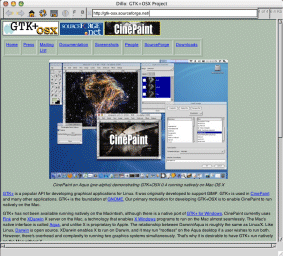| Home | Press | Mailing Lists | Documentation | Screenshots | People | SourceForge | Downloads |
Hollywood, CA - Monday, September 22, 2003 - HEML, the Hypertext Edit Markup Language, is a simplified markup language for editing Web pages. HEML, which is transparently compatible with HTML, is intended for editing ordinary Web pages or for a program's built-in help system.
The HEML Web editor, called We, is a very lightweight browser/editor (about 400kb) based on GTK+. Its small size makes We/HEML suitable as an integrated help system for other programs. Many program designers in seeking a cross-platform solution for displaying help files have turned to HTML, but are frustrated by the performance of conventional Web browsers. We/HEML offers WYSIWYG display of HTML pages without the frustrating slowdown that users have come to expect when launching Mozilla or Internet Explorer.
 |
|
We/HEML runs on Linux and is being ported to Mac OS X Aqua and Windows. We/HEML is a branch of the Linux Dillo Web browser, but is not associated with that project.(The Dillo project does not welcome contributors who support non-free operating systems.)
The Web was originally envisioned as a place where people would write as freely as they read. That hasn't happened. The complexity of writing HTML was too much of a barrier.
WYSIWYG editors don't really address the problem. Although easier to use than writing HTML by hand, they are much more like slaving over a document in Word or Quark than popping off a quick email in Outlook Express. Even experts in DreamWeaver hesitate to pop open a Web document to make a minor edit because of the time it will take.
The HEML browser is a WYSIWYG browser, but not a WYSIWYG editor. When editing it is more like using email where trivial punctuation is often used as markup, to indicate *bold* for instance. HEML, with just a dozen simple rules similar to that rule for bold, is able to represent everything a typical web page needs including lists and tables.
HEML is a transitory format. We/HEML converts back to HTML as the document is saved. Content is converted from/to HTML automatically, e.g., index.html. There is never an index.heml file.
Free and open source.
The 0.7.3 Linux version of Dillo is being used as the development base for We/HEML for Windows and Mac OS X. The first release of We/HEML will be available in December 2003. Open source developers who would like to help are encouraged to join the We/HEML mailing list or contact Robin Rowe directly.
The idea for We/HEML was conceived by Robin Rowe to be the next generation help system for CinePaint. CinePaint is the most popular open source tool in feature film production.
Questions to Robin.Rowe@MovieEditor.com
818-243-0339
###